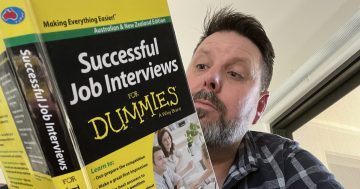Ashley Stahl* points out three mistakes people make during job interviews that often mean the difference between getting that dream job and the rejection letter.
 Let’s be real, with all the resume updates, networking events and hours you could spend submitting job applications, the job hunt can be brutal.
Let’s be real, with all the resume updates, networking events and hours you could spend submitting job applications, the job hunt can be brutal.
By the time you finally get asked to come in for an interview, you’re not only tired, but also your nerves have taken hold of you, and you’re sweating through your blazer in the lobby.
As a career coach, many clients have come to me for help after doing all the leg work to land interviews, only to walk into the room and unknowingly drop the ball.
Here’s the thing: Acing an interview largely comes down to having emotional intelligence, as well as recognising how you may be deterring the interviewer from hiring you.
Through the years I’ve spent coaching clients from all walks of the workforce, I have found these three common interview mistakes to be the reason for not getting hired.
Telling them everything
Many interviews start off with the really open-ended question: “Tell me about yourself.”
For most people, this leads down a rabbit hole of accidentally spewing your entire life history to a complete stranger or, even worse, simply regurgitating everything they could read at a glance of your resume.
Or, they ask you about a questionable career shift or a gap in your resume, which prompts you to reveal your personal struggles or a story about the boss who fired you.
No matter how much of a connection you have with your interviewer, remember that over-sharing that early will come across as unprofessional — and untrustworthy.
Intentionally prepare your interview answers in advance to questions that you foresee.
Practice breeds certainty, and certainty breeds confidence, so be sure to practice and rehearse your answers.
You’ve heard the saying ‘practice makes perfect’.
There’s a reason for that.
We live in a world where musicians have dress rehearsals, and actors shoot the same scene multiple times.
Who are you to think that you shouldn’t also be practicing for your interview performances?
Being cold or negative
An interview is a high-stakes experience that leads to being nervous and anxious.
What most people don’t realise is that anxiety can often be expressed as anger or negativity.
Sometimes, the attempt to be professional appears cold, and it makes sense that mastering this state of being is challenging.
After all, you may be serious about the position for which you’re interviewing.
Remember to tune into your inner human that knows how to bond and connect with another.
Always remember, what you say about others says a lot about you.
It might be tempting to talk smack about an old boss or employer when answering an interview question, but it will only make you look bad.
Studies have revealed that negative perceptions of others are linked to higher levels of narcissism and antisocial behaviour, all of which the interviewer may consciously or subconsciously pick up on.
In order to make sure your interviewer walks away with warm fuzzies, try sharing something personal about why the job aligns with your purpose or mission.
This could be “the reason this opportunity strikes a personal chord with me is…” and then share whatever it is that brings passion into your work.
Always remember to look them in the eye, and yes, amongst all the stress, don’t forget to smile and have a good time.
Being unaware of the organisation’s culture
If you are on a serious job hunt it can begin to feel like you are turning into a zombie in search of the right fit.
If you aren’t careful, you might walk into an interview unprepared to speak to the specific role.
Take the time to really do your research before you walk into the lobby for an interview.
This includes not only the job description and the organisation’s products or services, but also getting a strong grasp on its culture.
We know the first impression matters, and part of that is what you wear.
It is never a good idea to show up casual to an interview, but it is in your best interest to know beforehand what the workplace environment is like.
Search through the organisation’s social media for any workplace images.
This not only tells you what to wear, but also whether the culture aligns with what you are looking for.
During this search begin to compile a list of questions specific to the role.
There is nothing more off-putting for an interviewer than a candidate who has no questions.
Always remember that as the person being interviewed, you are not calling the shots, they are.
They brought you in to talk, so let them lead.
Save your inquiries for the end, when they open the floor for you to ask them questions.
*Ashley Stahl is a career coach, keynote speaker, podcast host and author. In a previous life she was award-winning counter-terrorism professional. She can be contacted at ashleystahl.com.
This article first appeared at ashleystahl.com











